The First Responder Playbook: Insights on Leadership and Training
🎙️ The First Responder Playbook Insights on Leadership and Training for Those Who Serve From the front lines to the front office, this podcast is your go-to guide for building bold, battle-tested leaders in the world of public safety. Hosted by first responders, for first responders, The First Responder Playbook delivers real-world lessons on leadership, resilience, tactical training, and the mental edge it takes to thrive in high-stakes environments. Each episode dives into candid conversations with law enforcement officers, firefighters, EMS professionals, and thought leaders who are shaping the future of first responder training. Whether you’re a rookie looking to grow or a seasoned vet sharpening your edge, this is the podcast that helps you lead with confidence and train with purpose. 🚨 No fluff. No ego. Just actionable insight to help you lead the way.
Episodes
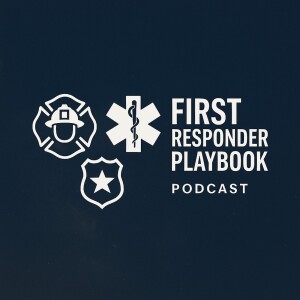
11 hours ago
11 hours ago
Welcome to another episode of The First Responder Playbook. In today’s show, host Brent sits down with Erik Holt, a former fire chief from Colorado whose story goes far beyond fighting fires. Erik takes us deep into a wild tale of small-town politics, election fraud, and personal sacrifice—sharing how he stood up against corruption and paid the price for doing the right thing. From building a struggling volunteer department into a thriving team, to uncovering blatant election irregularities right in his own fire station, Erik’s journey is equal parts inspiring and cautionary.
As he walks us through the twists and turns—from witnessing suspicious election day activities and handing over evidence to the DA, to being ousted from his job and fighting a legal battle that’s now landed in the federal appeals court—Erik’s unwavering commitment to public service and the Constitution shines through. This episode isn’t just about fire service leadership; it’s about the moral courage it takes to stand up for what’s right, even when the consequences threaten everything you’ve worked for.
If you’ve ever wondered how corruption can infiltrate even the smallest communities, or how one person’s determination can rally a movement for change, Erik Holt’s story is one you won’t want to miss. So settle in as we dive into this powerful conversation at the crossroads of leadership, integrity, and the fight for justice.
#electionfraud #bankfraud #firstresponder #fire #fireservice

3 days ago
3 days ago
On this deeply moving episode of The First Responder Playbook, host Brent sits down with Susan Snow—trauma resiliency coach, speaker, and author. Susan opens up about the life-altering night she lost her father, a Los Angeles police detective, in the line of duty when she was just 17. She shares her raw, emotional journey through grief, trauma, and survival, highlighting the lack of mental health resources for law enforcement families at the time and how that shaped her own battles with PTSD, anxiety, and depression.
After years of masking her pain and struggling in silence, Susan found healing and purpose, eventually dedicating her life to helping others navigate trauma. Her story is one of resilience, growth, and hope—reminding us of the importance of mental health support, especially for those in the first responder community and their loved ones. Susan’s honesty and passion shine throughout the conversation, inspiring listeners to break the stigma around therapy, seek help, and find a path to recovery. She also discusses her book, The Other Side of the Gun: My Journey from Trauma to Resiliency, and offers insights into supporting first responders and their families.
Whether you’re in uniform, support someone who is, or simply appreciate stories of perseverance, this episode is sure to resonate and uplift. Tune in for an unforgettable conversation about sacrifice, strength, and rediscovering joy after tragedy.
Susan’s website: https://susansnowspeaks.com
Link to her book: https://amzn.to/45YYuGW
#mental health #trauma #recovery #resilience #police #first responder #first responder podcast #mental health #coaching

4 days ago
4 days ago
Welcome to this episode of the First Responder Playbook. Join our host and Sergeant V from DXI Training Solutions for an in-depth discussion about the essential aspects of carrying knives as a first responder. Discover the various roles a knife can play, from a backup weapon to a general utility tool, and the importance of understanding its use based on departmental policies and personal preferences.Learn about the features of different types of knives, the significance of practicing safe handling, and tips for carrying and deploying them effectively. This episode offers valuable insights into the balance between lethal and non-lethal options in law enforcement, emphasizing the need for proficiency and continuous training.Whether you're new to the field or looking to refresh your skills, this conversation will provide practical advice on making informed choices about the tools you carry and how to use them safely. Connect with us and share your thoughts on future topics!

Friday Jun 06, 2025
Friday Jun 06, 2025
Join us in this enlightening episode of the First Responder Playbook as we welcome Sharon Dunleavy, an educational advocate dedicated to enhancing the educational success of children in foster care. Sharon shares her invaluable insights into the unique challenges faced by these children, emphasizing how trauma impacts their learning and behavior.
Discover actionable strategies for first responders to effectively support and communicate with kids experiencing crisis. Sharon offers practical advice on being trauma-informed, fostering teamwork among first responders, and empowering children through choice and calm interaction in stressful situations.
Explore the legal landscape surrounding foster children's education, and learn how first responders can collaborate with schools and mental health professionals to create a support network that bridges law enforcement, education, and child welfare effectively. This episode is a must for anyone interested in improving outcomes for vulnerable children and enhancing community safety.

Wednesday Jun 04, 2025
Wednesday Jun 04, 2025
Step onto the front lines with this episode of The First Responder Playbook, as host Brent sits down with Mark Mowbray—Marine Corps and Army veteran, former corrections officer, trooper, and author-to-be. Mark shares his remarkable career journey, from seeking purpose after high school, through the rigors of Parris Island, SWAT-style prison teams, and the realities of Ohio corrections, all the way to patrolling city streets and country roads.
Mark unpacks how the “Take Point Mindset”—stepping up and taking control of your own narrative—has shaped his life and leadership style. Hear firsthand why confidence, respect, and mentorship matter in high-stress roles, and the difference between managing and truly leading a team. The conversation dives deep into the importance of mental and physical readiness, proactive policing, and the value of paying knowledge forward—plus, Mark shares powerful stories about commanding respect behind prison walls and on the street.
If you're looking for inspiration, leadership wisdom, or real talk about life as a first responder, this episode delivers. Mark opens up about writing his first book, the lessons he's learned, and how every cop has a story worth sharing. Tune in for an honest, motivating conversation about finding your "why," building confidence without cockiness, and leaving a legacy for your family and fellow first responders.
Follow Mark on LinkedIn or check out Take Point Mindset to stay connected and learn more about his training and upcoming book!
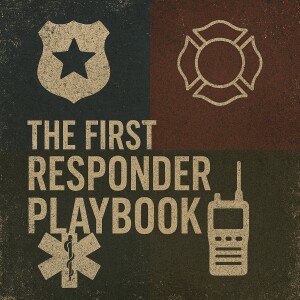
Wednesday May 21, 2025
Wednesday May 21, 2025
In this engaging episode, Brent sits down with Patrick Faulkner—a seasoned law enforcement professional, Air Force veteran, and host of the “Knock and Talk Show”—to unpack his winding journey through policing, military service, and ultimately, first responder training through ADB Nation. From tales of policing in both large metro areas and tiny “Mayberry”-like towns, to the challenges faced after leaving law enforcement, Patrick’s candor brings both humor and hard truths to the forefront.
Highlights include wild detective stories (like busting an international burglary ring where an entire house was built with stolen goods), navigating small-town policing, the evolution of community policing, and the toll of transitioning out of service. The episode also explores Patrick’s experience starting his own podcast, the origins and mission behind ADB Nation and ADB Training, and the importance of building a positive, supportive community for first responders.
Key Topics
Patrick’s Law Enforcement and Military Journey:
Air Force avionics, tours in Jordan and Bahrain, and struggles transitioning to civilian employment
Progression through large and small police departments, including unique challenges and local culture
Memorable case: Disrupting a Romanian-led construction theft ring and finding an international homicide fugitive
Small Town Policing vs. Big City Agencies:
Culture shock and adaptation from metro policing to “Mayberry”-style law enforcement
Chief’s supportive style and the quirks of working in a tight-knit community
Career Transition & Personal Struggles:
Impact of injury and being pushed out of policing
Dark period of identity loss, divorce, and the difficulties faced by LEOs leaving the profession
The need for ongoing support and community for retired or transitioning first responders
ADB Nation & ADB Training:
Founding story and focus on positive, peer-driven support and elite-level training for first responders
Innovative, immersive courses (e.g., undercover certification, cryptocurrency investigations, wellness)
Vision for nationwide impact and fostering a supportive, non-echo chamber environment
Stories from the Knock and Talk Show:
Origins: Born from preserving “big fish” policing stories and sharing much-needed levity in a tough profession
The power of storytelling, humor, and camaraderie for officer resilience
Memorable Quotes
“When you get out of law enforcement, you leave an agency—your spot is replaced… You’re only in their mind for about six months. That’s it.” – Patrick
“If you want to learn about your community, you have to go knock on doors… Stop by, you know, Annie M at the end of Elm Street… She’ll tell you what’s up with the meth house behind hers!” – Patrick
“ADB stands for A Different Breed. Because first responders are a different breed. That’s why we’re here.” – Patrick
Resources & Mentions
ADB Nation – Peer community & training platform for first responders
Knock and Talk Show – Patrick’s law enforcement storytelling podcast (Apple, YouTube, Spotify, etc.)
ADB Training Classes: Undercover certification, cryptocurrency investigation, wellness for LEOs
Where to Listen
Find the Knock and Talk Show on all major platforms: Apple Podcasts, YouTube, iHeartRadio, Spotify, and more.
Connect:
Patrick Faulkner: [LinkedIn], [Knock and Talk Show]
Brent: The First Responder Playbook Podcast host
Thanks for tuning in! Subscribe, rate, and let us know your thoughts—or share your own wild first responder story!
#police #firstresponder #mentalhealth #policeleadership #leadership #k9
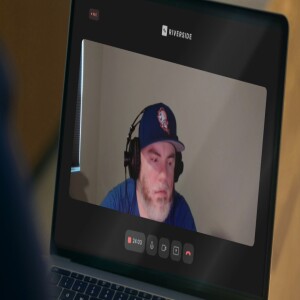
Saturday May 17, 2025
Saturday May 17, 2025
On today’s episode, I sat down with Keith Grounsell—a two-time chief of police, DEA special agent, and international law enforcement leader—with nearly 27 years of experience taking on everything from undercover narcotics to fighting global corruption. Keith shared powerful lessons on leadership, innovation, and never taking “no” for an answer, whether it’s solving budget challenges or building trust with the community. If you want to level up your leadership mindset and get inspired to break barriers in any industry, this is an episode you don’t want to miss.
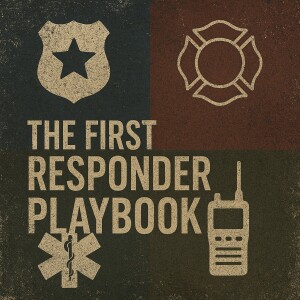
Wednesday May 14, 2025
Wednesday May 14, 2025
00:00 Overcoming Burnout: Finding Support
06:18 Signs of Job Stress Realization
07:13 First Responder Stress Warning
11:52 Brother Finally Understands Overnight Shift
13:46 "Use Your Time Off"
19:48 "Johnny: From Cop to Trainer"
22:58 "First Responders Need Diverse Friendships"
26:38 "Easy Access to Healthy Living"
27:40 "First Responder Support Resources"
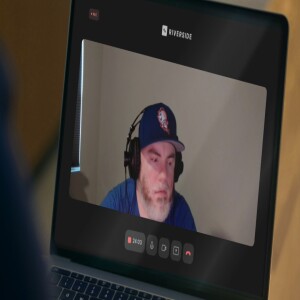
Friday May 09, 2025
Friday May 09, 2025
1. Travis’s Military Background and Transition Out of the Marine Corps
Duration in the Marine Corps (13 years)
Reasons for leaving: changes in times, God’s plan, instructor role, need to move on
Positive outlook on his service and reasons for not criticizing the Marine Corps
2. Transitioning to Civilian Life: Initial Experiences
Early transition jobs: working at Don Corp and Lockheed Martin
Surrounded by other prior military members
Similar structure and culture to military life
Work on military bases in similar environments
The shift to a true civilian job with the Oklahoma Department of Veterans Affairs (ODVA)
Differences in civilian work culture and structure
Feeling of disconnection upon returning to Oklahoma and Wagner
3. Challenges Faced By Veterans (and First Responders) in Transition
Lack of effective support programs for transitioning
Existing programs seen as insufficient, unwelcoming, or too basic
The unique struggle of losing structure and camaraderie
The gap in support for both veterans and their spouses/families
The role of pride and stigma in accessing available resources
Problems specific to those with longer service versus shorter-term veterans
4. Recommendations and Ideas for Improved Transition Programs
Need for state-funded, all-encompassing programs, including for law enforcement and ex-offenders
Centralized places for job interviews and resources, consideration for pride and ease of access
Critique of profit-focused veteran "nonprofits"
Suggested improvements:
Multi-week, hands-on outboarding training (rather than insufficient week-long classes)
Resume writing, interview coaching, translation of military to civilian skills
Connecting military technical training directly to civilian jobs (e.g., CDLs, aviation maintenance)
Focus on practical education and trade skills over formal degrees
5. The Value of Military and Law Enforcement Skills in Civilian Life
Emphasis on skills learned in military/service that are valuable (leadership, discipline, technical expertise)
Discussion about trade school vs. college versus on-the-job learning
Importance of belief in oneself and overcoming imposter syndrome
Advantages and success stories of veteran-owned businesses
6. The Importance of Camaraderie, Structure, and Support Networks
Personal experience of missing camaraderie when working non-law enforcement jobs (insurance agent example)
Need for continued support, routines, structure, and belonging
Difficulty of functioning in unstructured “civilian” roles after military/first responder service
7. Mental Health, Compassion, and Crisis Intervention
Lack of tailored, scenario-based mental health support and training (especially for law enforcement)
Veterans’ and first responders’ unique needs and struggles regarding mental health
The importance of compassion, understanding, and de-escalation in law enforcement
Shortcomings in current mental health training (minimal continuing education requirements, lack of practical value)
The impact of mental health struggles for those in service and their transition to civilian life
Peer support, debriefing, and coaching: proposed improvements for agencies
8. Leadership, Supervision, and Organizational Culture
Problems with “old school” authoritarian leadership styles
The significance of genuinely caring for and connecting with people under your supervision
Importance of evaluations and feedback (frequency, depth, handling corrective criticism)
Value of supervisors/coaches who help with goal-setting, debriefs, and personal growth
Examples of good and bad supervisory relationships and their lasting impacts
9. Lessons Learned and Moving Forward
The importance of humility and forgiveness in leadership
Recognizing individual differences and adapting leadership approaches accordingly
Encouraging a culture of positive reinforcement, support, and continuous improvement
10. Practical Resources and Offers for Help
Travis’s expertise and willingness to help with navigating the VA system
Offer to collaborate on mental health and crisis intervention training for law enforcement
Encouragement to reach out for guidance, drawing on Travis’s network and experience
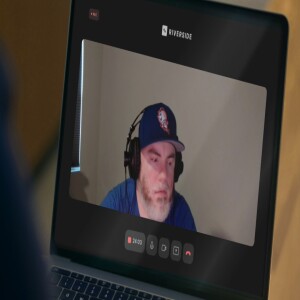
Friday May 09, 2025
Friday May 09, 2025
Here’s a comprehensive sequence of topics covered in the episode, with sub-topics for each main subject:
1. Introduction and Background of the Guest
Travis Mitchell’s connection to Wagner and background
Travis’s status as a Marine Corps veteran and lifelong association
The episode’s focus on military life and transitions
2. Decision to Join the Marine Corps
Influence of cousin Michael and early impressions
Discovery of aviation roles within the Marines
Impact of 9/11 on motivation to enlist
Role of community and patriotism in small towns
Decision-making process: considering other branches, perception of Marine Corps challenge and discipline
3. Marine Corps Boot Camp Experience
Location and first experiences flying and traveling (San Diego, MCRD)
Initial reception by drill instructors
Transfer and confusion on arrival
Environment shaped by Vietnam veteran Marines and tough discipline
4. Details of Boot Camp
Length and intensity (thirteen weeks, physical and mental challenges)
Comparisons to other military branches’ boot camps
Transition rules for changing branches
5. Civilian to Military Transition
Adjusting to the “90 to nothing” Marine Corps pace
Handling physical and disciplinary demands
Breaking down and rebuilding habits
6. The Crucible and Marine Corps Traditions
Structure and challenge of “the Crucible”
Timeline within boot camp (up north to Camp Pendleton, rifle week, medical training)
Mental and physical exhaustion
Pride and motivation from drill instructors
The tradition of the Eagle, Globe, and Anchor ceremony
Rituals and transition to being called a Marine
7. Post-Boot Camp Training
Marine Combat Training (MCT), distinction between grunts and non-grunts
Basic skills: land navigation, rifle training, hikes
Importance and memory of simple rewards (like fruit after hikes)
8. Military Occupational Specialty (MOS) Training
Advanced training for CH-46 mechanics (the “frog” helicopter, similarities to the Chinook)
Reflections on aircraft phases and updates in Marine Corps aviation
Building close friendships (Paxton, best man story)
9. Deployments and Service Abroad
Assignment to North Carolina and deployment timeline
Workup process before deployment
First deployment to Iraq: Fallujah context, combat environment, differences in early and later war periods
Second deployment to Iraq: growth of infrastructure (PX, coffee shops), changing conditions
Transition to working with MV-22 Osprey (“B 22s”/V-22s)
10. Experiences in Iraq
Differences observed across multiple deployments
Involvement in nation-building and working with local forces
Evolving levels of danger and infrastructure development
11. Experiences Aboard Navy Ships
Port call in Jordan and mortar attack on U.S. vessel
Combat action ribbon awarded to Navy personnel
Impact on crew and memory of friends involved
Quick news coverage and the sudden departure from danger zones
12. Encounters with Piracy
Somali Pirate attack on their ship, response procedures
Multilingual warnings, deployment of defensive measures (SeaWiz, Marine snipers)
Capture and medical treatment of pirates
Ethics and complexity in dealing with wartime enemies (treatment of prisoners, Geneva Convention)
Transfer of pirates to the brig and repatriation to America
13. Operational Application and Reflection
“Gator circle” deployments (patrol and presence operations)
Context of Somalia and regional instability
Historical perspective on the U.S. involvement in the area (reference to Black Hawk Down)
Challenges in conducting operations due to adversaries' tactics (use of civilians as shields)
Targeted operations and the pursuit of high-value individuals







